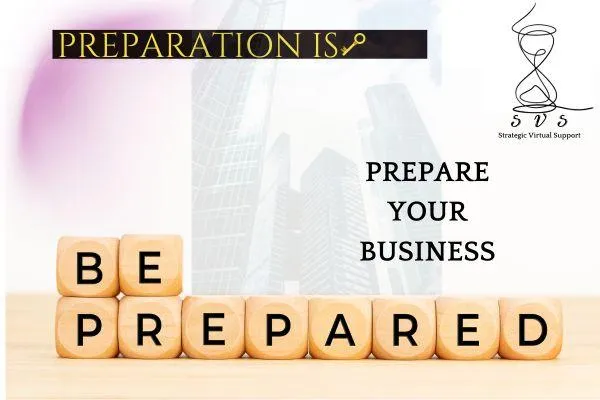

Preparation is Key - Prepare Your Business
PREPARE YOUR BUSINESS
In today's fast-paced business landscape, the role of virtual assistants has evolved significantly. No longer are they limited to handling mundane administrative tasks; they now serve as strategic partners, helping businesses streamline operations and achieve their goals.
To make the most of your virtual assistant, proper preparation is essential. In this blog, we'll guide you through the steps to prepare for your strategic virtual assistant effectively.

10 ways to prepare your business for strategic support.
Define Your Objectives:
Start by clearly defining your business objectives and what you expect from your virtual assistant. Are you looking for support in managing your schedule, handling customer inquiries, or conducting market research? Understanding your goals will help you identify the right skills and expertise your virtual assistant should possess.
Select the Right Virtual Assistant:
Finding the right virtual assistant is crucial. Look for candidates with relevant experience in your industry or the specific tasks you need assistance with. Conduct interviews or seek referrals to ensure a good fit. Communication skills are equally important, as your virtual assistant should be able to understand your needs and convey information effectively.
Establish Communication Channels:
Clear communication is key to a successful virtual assistant partnership. Set up regular meetings, decide on communication tools (e.g., email, video conferencing, project management software), and establish expectations for response times. Create a structured communication plan to keep both parties informed and aligned.
Define Roles and Responsibilities:
Clearly outline the roles and responsibilities of your virtual assistant. Provide detailed job descriptions and guidelines for each task they will handle. This ensures that your assistant understands their role within your organization and can work autonomously.
Data Security and Access:
If your virtual assistant will have access to sensitive information, implement robust security measures. Use secure file-sharing platforms, password management tools, and encryption to protect your data. Additionally, establish clear policies regarding data access and confidentiality.
Training and Onboarding:
Invest time in training your virtual assistant. Provide access to relevant resources and conduct training sessions to familiarize them with your company's culture, processes, and tools. The more knowledgeable your assistant is, the more effectively they can support your business.
Set Performance Metrics:
Establish key performance indicators (KPIs) and metrics to evaluate the effectiveness of your virtual assistant. Regularly review their performance against these metrics to ensure they are meeting your expectations and contributing to your business goals.
Feedback and Improvement:
Encourage open and constructive feedback from both sides. Regularly discuss challenges, successes, and areas for improvement. This feedback loop is essential for refining the working relationship and achieving optimal results.
Flexibility and Adaptability:
Be prepared to adapt to changing circumstances. Your business needs may evolve, and your virtual assistant should be able to adapt accordingly. Maintain open lines of communication to discuss any necessary adjustments.
Legal Considerations:
Ensure that you have a well-drafted contract in place that outlines terms of employment, compensation, and termination procedures. Legal clarity is essential to protect both you and your virtual assistant.
By following these steps and taking the time to prepare effectively, you can maximize the benefits of your strategic virtual assistant. With the right foundation in place, your virtual assistant can become a valuable asset, helping you navigate the complexities of today's business environment with efficiency and effectiveness.
